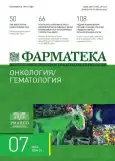Analysis of pharmacotherapy in patients with HR+HER2- metastatic breast cancer with PIK3CA mutations in real clinical practice
- Authors: Fateeva A.V.1, Eliseeva E.V.2, Apanasevich V.I.2, Zaemskaya A.A.2
-
Affiliations:
- Primorsky Regional Oncology Dispensary
- Pacific State Medical University
- Issue: Vol 31, No 7 (2024)
- Pages: 74-81
- Section: Original articles
- Published: 13.12.2024
- URL: https://journals.eco-vector.com/2073-4034/article/view/646381
- DOI: https://doi.org/10.18565/pharmateca.2024.7.74-81
- ID: 646381
Cite item
Abstract
Background. The most common type of breast cancer (BC) is hormone receptor-positive HER2-negative (HR+ HER2-) tumors, approximately 40% of which have mutations in the PIK3CA oncogene encoding the catalytic subunit of the PI3K protein. The most effective pharmacotherapy for such neoplasms is the use of a combination of PI3Kα-specific inhibitors alpelisib and fulvestrant. However, in real clinical practice, the use of this combination did not become available immediately.
Objective. Retrospective analysis of the efficacy of various drug therapy options in the study cohort of patients in real clinical practice.
Methods. The study included 34 patients with HR+/HER2- metastatic breast cancer with PIK3CA mutation, who received treatment at the Primorsky Regional Oncology Dispensary.
Results. The median EFS in the group receiving CDk4/6 inhibitors was 27.00 months (95% CI: 18.00–78.00), and in the group not receiving CDk4/6 inhibitors it was 8.00 months (95% CI: 3.00–39.00), P=0.020. The median EFS in the alpelisib group was 65.00 months (95% CI: 19.00–78.00), the median EFS in the other therapy group (not receiving alpelisib) was 9.00 months (95% CI: 7.00–27.00). The differences in EFS were statistically significant (P=0.025).
Conclusion. Effective pharmacotherapy options for the study group of patients include the use of both CDk4/6 inhibitors and the PIK3 inhibitor alpelisib in combination with fulvestrant. Despite a number of limitations, the RWD study demonstrated improved survival outcomes for patients who were prescribed any CDk4/6 inhibitor and alpelisib.
Full Text
About the authors
Anastasia V. Fateeva
Primorsky Regional Oncology Dispensary
Author for correspondence.
Email: ralise@bk.ru
ORCID iD: 0000-0001-9413-367X
Head of the Department of Telemedicine Technologies, Oncologist, Chemotherapist
Russian Federation, VladivostokE. V. Eliseeva
Pacific State Medical University
Email: ralise@bk.ru
ORCID iD: 0000-0001-6126-1253
Russian Federation, Vladivostok
V. I. Apanasevich
Pacific State Medical University
Email: ralise@bk.ru
ORCID iD: 0000-0003-0808-5283
Russian Federation, Vladivostok
A. A. Zaemskaya
Pacific State Medical University
Email: ralise@bk.ru
ORCID iD: 0009-0008-1536-046X
Russian Federation, Vladivostok
References
- Howlader N., Altekruse S.F., Li C.I., et al. US incidence of breast cancer subtypes defined by joint hormone receptor and HER2 status. J Natl Cancer Inst. 2014;106(5):dju055-dju055. doi: 10.1093/jnci/dju055.
- Goncalves M.D., Hopkins B.D., Cantley L.C. Phosphatidylinositol 3-kinase, growth disorders, and cancer. N Engl J Med. 2018;379:2052.doi:62. dоi: 10.1056/NEJMra1704560.
- Fritsch C., Huang A., Chatenay-Rivauday C., et al. Characterization of the novel and specific PI3Kα inhibitor NVP-BYL719 and development of the patient stratification strategy for clinical trials. Mol Cancer Ther. 2014;13:1117–29. doi: 10.1158/1535-7163.MCT-13-0865.
- Juric D., Rodon J., Tabernero J., et al. Phosphatidylinositol 3-kinase α-selective inhibition with alpelisib (BYL719) in PIK3CA-altered solid tumors: results from the first-in-human study. J Clin Oncol. 2018;36:1291–99. doi: 10.1200/JCO.2017.72.7107.
- Avan J., Hyo S. Alpelisib in the Treatment of Breast Cancer: A Short Review on the Emerging Clinical Data. Breast Cancer: Targets and Therapy. 2020:12;251–58 doi: 10.2147/BCTT.S219436.
- Fabrice A., Eva С., et al. Alpelisib for PIK3CA-Mutated, Hormone Receptor–Positive Advanced Breast Cancer. N Engl J Med. 2019;380:1929–40. doi: 10.1056/NEJMoa1813904.
- U.S. Food and Drug Administration, Resources for Information, Approved Drugs [Internet]. FDA approves alpelisib for metastatic breast cancer [05.28.2019]. URL: https://www.fda.gov/drugs/resources-information-approved-drugs/fda-approves-alpelisib-metastatic-breast-cancer
- Berenjeno I.M., Piсeiro R., Castillo S.D. et al. Oncogenic PIK3CA induces centrosome amplification and tolerance to genome doubling. Nat Commun. 2017;8(1):1773. doi/10.1038/s41467-017-02002-4.
- Ralitsa R.M., Vanhaesebroeck B. Cracking the context-specific PI3K signaling code. Cell Biol. 2020;13:1–13. doi: 10.1126/scisignal.aay2940.
- Соколова Т.Н., Соловьева Т.И. Клинико-морфологические особенности опухолей молочной железы с мутациями PIK3CA у российских больных: наблюдательное исследование. Современная Онкология. 2022;24(1):12–23. [Sokolova T.N., Solovieva T.I. Clinical and morphological features of breast tumors with PIK3CA mutations in Russian patients: observational study. Journal of Modern Oncology. 2022;24(1):12–23. (In Russ.)]. doi: 10.26442/18151434.2022.1.201435.
- Vasan N.,et al. Double PIK3CA mutations in cis increaseoncogenicity and sensitivity to PI3Ka inhibitors. Cancer. 2019;366:714–23. doi: 10.1126/science.aaw9032.
- Dogruluk T., et al. Identification of Variant-Specific Functions of PIK3CA by Rapid Phenotyping of Rare Mutations. Cancer Res. 2015;75(24):5341–54. doi: 10.1158/0008-5472.CAN-15-1654.
- Martinez-Saez O., et al. Frequency and spectrum of PIK3CA somatic mutations in breast cancer. Breast Cancer Res. 2020;22 (45):1–9. doi: 10.1186/s13058-020-01284-9.
- Rugo H.S., Raskina K., et al. Biology and Targetability of the Extended Spectrum of PIK3CA Mutations Detected in Breast Carcinoma. Clin Cancer Res. 2023;29(6):1056–67. doi: 10.1158/1078-0432.CCR-22-2115.
- McCartney A., Migliaccio I., et al. Mechanisms of Resistance to CDK4/6 Inhibitors: Potential Implications and Biomarkers for Clinical Practice 2019; Front Oncol. 2019;9(666):3–8. doi: 10.3389/fonc.2019.00666.
- Neven P., et al. 346P Ribociclib (RIB)+fulvestrant (FUL) in hormone receptor-positive (HR+), human epidermal growth factor receptor 2-negative (HER2-) advanced breast cancer (ABC): MONALEESA-3 biomarker analyses. Ann Oncol. 2018;29:8. doi: 10.1016/j.annonc.2021.05.353.
- Aleix Prat, et al. Intrinsic Subtype and Overall Survival of Patients with Advanced HR+/HER2+ Breast Cancer Treated with Ribociclib and ET: Correlative Analysis of MONALEESA-2, -3, -7. Clin Cancer Res. 2024;30:793–802. doi: 10.1158/1078-0432.CCR-23-0561.
- Chen Z., et al. 345P Everolimus-based therapy versus conventional therapy for refractory breast cancer patients with PI3K/AKT/mTOR mutations. Ann Oncol. 2018;8:29. doi: 10.1002/cam4.2460.
- Neven P., et al. 346P Ribociclib (RIB)+fulvestrant (FUL) in hormone receptor-positive (HR+), human epidermal growth factor receptor 2-negative (HER2-) advanced breast cancer (ABC): MONALEESA-3 biomarker analyses. Ann Oncol. 2018;29:8. doi: 10.1016/j.annonc.2021.05.353.
- O’Leary B., Hrebien S., Morden J.P., et al. Early circulating tumor DNA dynamics and clonal selection with palbociclib and fulvestrant for breast cancer. Nat Commun. 2018;9(1):896. doi: 10.1038/s41467-018-03215-x.
- Chia S., et al. Alpelisib + endocrine therapy in patients with PIK3CA-mutated, hormone receptor-positive, human epidermal growth factor receptor 2-negative, advanced breast cancer: Analysis of all 3 cohorts of the BYLieve study. J Clin Oncol. 2023;41:16_suppl, 1078–78. doi: 10.1200/JCO.2023.41.16_suppl.1078.
Supplementary files









